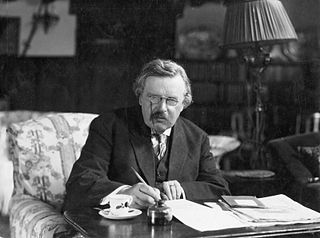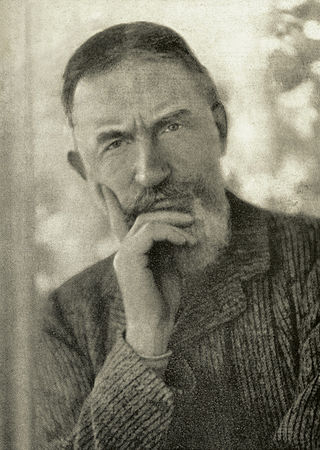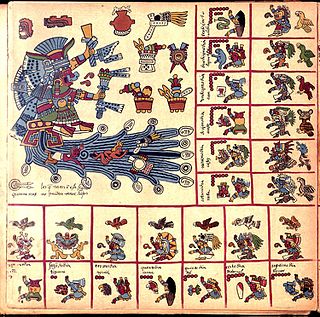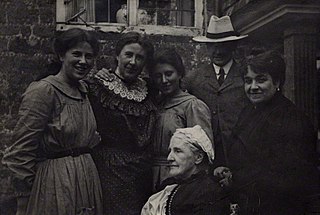
Gilbert Keith Chesterton was an English writer, philosopher, Christian apologist, a literary and art critic.

George Bernard Shaw, known at his insistence as Bernard Shaw, was an Irish playwright, critic, polemicist and political activist. His influence on Western theatre, culture and politics extended from the 1880s to his death and beyond. He wrote more than sixty plays, including major works such as Man and Superman (1902), Pygmalion (1913) and Saint Joan (1923). With a range incorporating both contemporary satire and historical allegory, Shaw became the leading dramatist of his generation, and in 1925 was awarded the Nobel Prize in Literature.

William Shakespeare was an English playwright, poet and actor. He is widely regarded as the greatest writer in the English language and the world's pre-eminent dramatist. He is often called England's national poet and the "Bard of Avon". His extant works, including collaborations, consist of some 39 plays, 154 sonnets, three long narrative poems, and a few other verses, some of uncertain authorship. His plays have been translated into every major living language and are performed more often than those of any other playwright. Shakespeare remains arguably the most influential writer in the English language, and his works continue to be studied and reinterpreted.

Chalchiuhtlicue[t͡ʃaːɬt͡ʃiwˈt͡ɬikʷeː] is an Aztec deity of water, rivers, seas, streams, storms, and baptism. Chalchiuhtlicue is associated with fertility, and she is the patroness of childbirth. Chalchiuhtlicue was highly revered in Aztec culture at the time of the Spanish conquest, and she was an important deity figure in the Postclassic Aztec realm of central Mexico. Chalchiuhtlicue belongs to a larger group of Aztec rain gods, and she is closely related to another Aztec water god called Chalchiuhtlatonal.

Thomas Carlyle was a British essayist, historian, and philosopher from the Scottish Lowlands. A leading writer of the Victorian era, he exerted a profound influence on 19th-century art, literature, and philosophy.

Chengyu are a type of traditional Chinese idiomatic expression, most of which consist of four characters. Chengyu were widely used in Classical Chinese and are still common in vernacular Chinese writing and in the spoken language today. According to the most stringent definition, there are about 5,000 chéngyǔ in the Chinese language, though some dictionaries list over 20,000. Chéngyǔ are considered the collected wisdom of the Chinese culture, and contain the experiences, moral concepts, and admonishments from previous generations of Chinese. Nowadays, chéngyǔ still play an important role in Chinese conversations and education. Chinese idioms are one of four types of formulaic expressions, which also include collocations, two-part allegorical sayings, and proverbs.

John Augustin Daly was one of the most influential men in American theatre during his lifetime. Drama critic, theatre manager, playwright, and adapter, he became the first recognized stage director in America. He exercised a fierce and tyrannical control over all aspects of his productions. His rules of conduct for actors and actresses imposed heavy fines for late appearances and forgotten lines and earned him the title "the autocrat of the stage." He formed a permanent company in New York and opened Daly's Theatre in New York in 1879, and a second one in London in 1893.

Bathing is the act of washing the body, usually with water, or the immersion of the body in water. It may be practiced for personal hygiene, religious ritual or therapeutic purposes. By analogy, especially as a recreational activity, the term is also applied to sun bathing and sea bathing.

Mary Herbert, Countess of Pembroke was among the first Englishwomen to gain notice for her poetry and her literary patronage. By the age of 39, she was listed with her brother Philip Sidney and with Edmund Spenser and William Shakespeare among the notable authors of the day in John Bodenham's verse miscellany Belvidere. Her play Antonius is widely seen as reviving interest in soliloquy based on classical models and as a likely source of Samuel Daniel's closet drama Cleopatra (1594) and of Shakespeare's Antony and Cleopatra (1607). She was also known for translating Petrarch's "Triumph of Death", for the poetry anthology Triumphs, and above all for a lyrical, metrical translation of the Psalms.

Logan Pearsall Smith was an American-born British essayist and critic. Harvard and Oxford educated, he was known for his aphorisms and epigrams, and was an expert on 17th century divines. His Words and Idioms made him an authority on correct English language usage. He wrote his autobiography, Unforgotten Years, in 1938.

Bardolatry is excessive admiration of William Shakespeare. Shakespeare has been known as "the Bard" since the eighteenth century. One who idolizes Shakespeare is known as a bardolator. The term bardolatry, derived from Shakespeare's sobriquet "the Bard of Avon" and the Greek word latria "worship", was coined by George Bernard Shaw in the preface to his collection Three Plays for Puritans published in 1901. Shaw professed to dislike Shakespeare as a thinker and philosopher because Shaw believed that Shakespeare did not engage with social problems as Shaw did in his own plays.
Edwin Nadason Thumboo B.B.M. is a Singaporean poet and academic who is regarded as one of the pioneers of English literature in Singapore.
Barking up the wrong tree is an idiomatic expression in English, which is used to suggest a mistaken emphasis in a specific context. The phrase is an allusion to the mistake made by dogs when they believe they have chased a prey up a tree, but the game may have escaped by leaping from one tree to another. The phrase means to mistake one's object, or to pursue the wrong course to obtain it.

A rearguard or rear security is a part of a military force that protects it from attack from the rear, either during an advance or withdrawal. The term can also be used to describe forces protecting lines, such as communication lines, behind an army. Even more generally, a rearguard action may refer idiomatically to an attempt at preventing something though it is likely too late to be prevented; this idiomatic meaning may apply in either a military or non-military context.

It takes two to tango is a common idiomatic expression which suggests something in which more than one person or other entity are paired in an inextricably-related and active manner, occasionally with negative connotations.
"Square peg in a round hole" is an idiomatic expression which describes the unusual individualist who could not fit into a niche of their society.
Damning with faint praise is an English idiom, expressing oxymoronically that half-hearted or insincere praise may act as oblique criticism or condemnation. In simpler terms, praise is given, but only given as high as mediocrity, which may be interpreted as passive-aggressive.

Let the Four Winds Blow is the second album by Tenpole Tudor and the follow-up to Eddie, Old Bob, Dick and Gary. Despite featuring the minor hit "Throwing My Baby Out With the Bath Water" the album and the follow-up single both failed to chart. It would be 27 years before the next album, Made it this Far would be released.

On Heroes, Hero-Worship, & the Heroic in History is a book by the Scottish essayist, historian and philosopher Thomas Carlyle, published by James Fraser, London, in 1841. It is a collection of six lectures given in May 1840 about prominent historical figures. It lays out Carlyle's belief in the importance of heroic leadership.
Subodh Chandra Sengupta was an Indian scholar, academic and critic of English literature, known for his scholarship on Shakespearean works. His books on William Shakespeare, which included Aspects of Shakespearian Tragedy, Shakespearian Comedy and Shakespeare's Historical Plays are critically acclaimed for scholarship and academic rigor. He was a professor in the Department of English Language and Literature at Presidency College, Calcutta, and after retirement from Presidency College, became Professor of English Language and Literature at Jadavpur University, Calcutta, as well as a professor of English literature at Ramakrishna Mission Residential College, Narendrapur, an autonomous college in Greater Calcutta under the University of Calcutta. The Government of India awarded him the third highest civilian honour of the Padma Bhushan, in 1983, for his contributions to literature and education.















